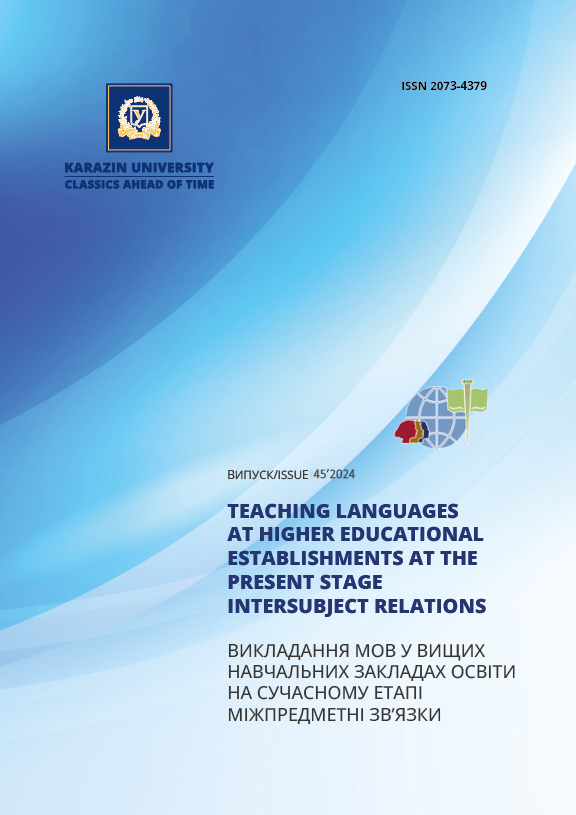Writing skills improvement and development of critical thinking
Abstract
The article discusses the importance of improving writing skills along with the development of critical thinking. Despite significant achievements in this area, the study of critical thinking and its individual aspects as a complex phenomenon, as a necessary component of the process of improving writing skills, remains relevant. The interest in this topic will not diminish. The aim of the article is to substantiate the necessity of a comprehensive approach to writing skills improvement, that should be based on the simultaneous development of both writing skills and critical thinking skills for higher education students; to describe teaching techniques and technologies effective for the development of writing in a foreign language using critical thinking skills.
The process of developing critical thinking takes place within the framework of improving discourse competence (coherence and cohesion), one of the four components (grammatical, sociolinguistic, discourse, strategic) defined as parts of the general communicative competence.
Discourse competence can be improved when the development and strengthening of the grammatical competence component (words and rules) have already been completed.
As the work on improving writing skills in foreign language classes for higher education students is supposed to adopt a holistic and comprehensive approach the Complex for improving writing skills is offered. The main requirements for the Complex for improving writing skills are as follows: grammatical competence (words and rules) is supposed to be basically formed; critical thinking skills should correspond to the accompanying mental operations; it is mandatory to work on words and phrases that enable logical transitions between between pieces of information in narration ; it is mandatory to work on techniques that train emotional control, the ability to communicate effectively under pressure while maintaining neutrality; and the development of cooperation skills and self-organization with the use of digital tools is essential.
A detailed list of technics is offered that are parts of the Complex for Improving Writing Skills, which consists of 3 stages (1) accumulation of information from various sources; 2) research/processing of information (comparison, analysis, evaluation, ordering; sorting; testing different points of view, different possibilities and justification); 3) conclusion, recognition and analysis of errors, decision-making). The Complex for Improving Writing Skills aligns with the core requirements for fostering critical thinking while enhancing communicative competence in foreign language classes at higher education institutions.
Downloads
References
Ivlievа, К., Rejdа, О., Gulievа, D. (2021). Тechnology implementation of critical thinking development in the process of teaching English in higher school. Foreign languages. №2/2021, pp. 23-29. DOI: https://doi.org/10.32589/1817-8510.2021.2.235676 [in Ukrainian].
Кorotка, N.V., Pidkolesnа, L.А. (2022). Formation of critical thinking technologies in learning English in a non-lingual university. Scientific Proceedings of Ostroh Academy National University: Philology Series. 16(84), pp. 99-102. DOI: 10.25264/2519-2558-2022-16(84)-99-102 [in Ukrainian].
Kravchuk, O. (2018). The role of critical thinking in teaching writing in foreign language classes. Young Scientist, №9(61), pp. 40-44 [in Ukrainian].
Critical thinking on English lessons. Study guide (2018). Каlynsка, H.V. Khmelnytskyi. Available at: https://naurok.com.ua/kritichne-mislennya-na-urokah-angliysko-movi-5346.html [Accessed 21 Aug. 2024] [in Ukrainian].
Marynchenko, H.M., Motsak, S.I. (2021). Formation of students’ critical thinking during distance learning. International scientific journal “Grail of Science”, № 4, pp. 463-467. Available at: https://doi.org/10.36074/grail-of-science [Accessed 07 May 2024] [in Ukrainian].
Panchenko, L. (2019). Development of critical thinking as a component of academic writing skills formation. Humanitarni nauky ta osvita [Humanities and Education]. №5, pp. 72-78 [in Ukrainian].
Revutskа, S.М. (2020). Тhe use of Classroom routines in memorization and further development of communicative competence. Teaching Languages at Higher Educational Establishments at the Present Stage. Intersubject Relations. 37, pp. 55-69. DOI: https://doi.org/10.26565/2073-4379-2020-37-06
Revutska, S. (2023). Development of critical thinking in the process of improving productive communication skills. Teaching Languages at Higher Educational Establishments at the Present Stage. Intersubject Relations. 43, pp. 102-111. DOI: https://doi.org/10.26565/2073-4379-2023-43-07 [in Ukrainian].
Syrota, S. (2021). Formation of critical thinking as the basis of writing skills in foreign language teaching. Educational Space: New Perspectives. 3, pp. 34-39 [in Ukrainian].
Formuvannia navychok krytychnoho myslenia na urokakh inozemnoi movy: navchalno-praktychnyi posibnyk [Formation of critical thinking skills on foreign language lessons: study guide]. (2017). O.S. Nikitchenko, O.A. Tarasova. Kharkiv: “Drukarnia Madryd” [in Ukrainian].
Bikowski, D., Vithanage, R. (2020). Effects of Web-Based Collaborative Writing on Individual L2 Writing Development. Language Learning & Technology. 24(1), pp. 94-115.
Brookfield, S. (2020). Critical Thinking & Learning in Adults: A Case Study in Transformative Learning on White Supremacy and White Racial Identity. Critical Thinking and Reasoning: Theory, Development, Instruction, and Assessment. Boston, MA. Netherlands: Brill Publishing. P. 114-130.
Elbow, P. (1998). Writing With Power: Techniques for Mastering the Writing Process. 2nd ed. New York: Oxford UP.
Elder, L., Paul, R. (2008). The Thinker’s Guide to How to Write a Paragraph: The Art of Substantive Writing.
Hughes, J., Dummett, P. (2019). Critical Thinking in ELT: A Working Model for the Classroom. National Geographic Learning.
Murawski, L. (2014). Critical Thinking in the Classroom…and Beyond. Journal of Learning in Higher Education. № 10, pp. 25-30.
Nickname, Z., Royafar, A. (2019). Critical thinking skills of undergraduate students of educational sciences at Tehran universities. Utopía y Praxis Latinoamericana. Vol. 24, núm. Esp. 6, pp. 54-63. Retrieved from: https://www.redalyc.org/journal/279/27962177007/html [Accessed 21 March 2023].
Swain, M., Lapkin, S. (1995). Problems in Output and the Cognitive Processes They Generate A Step towards Second Language Learning. Applied Linguistics. Volume 16, Issue 3, September 1995, pp. 371-391. DOI: https://doi.org/10.1093/applin/16.3.371
Wambsganss, T., et al. (2020). Supporting Collaborative Writing with Artificial Intelligence: A Research Agenda to Overcome Collaboration Challenges in Writing. Proceedings of the ACM on Human-Computer Interaction. 4(CSCW2), pp. 1-20.

